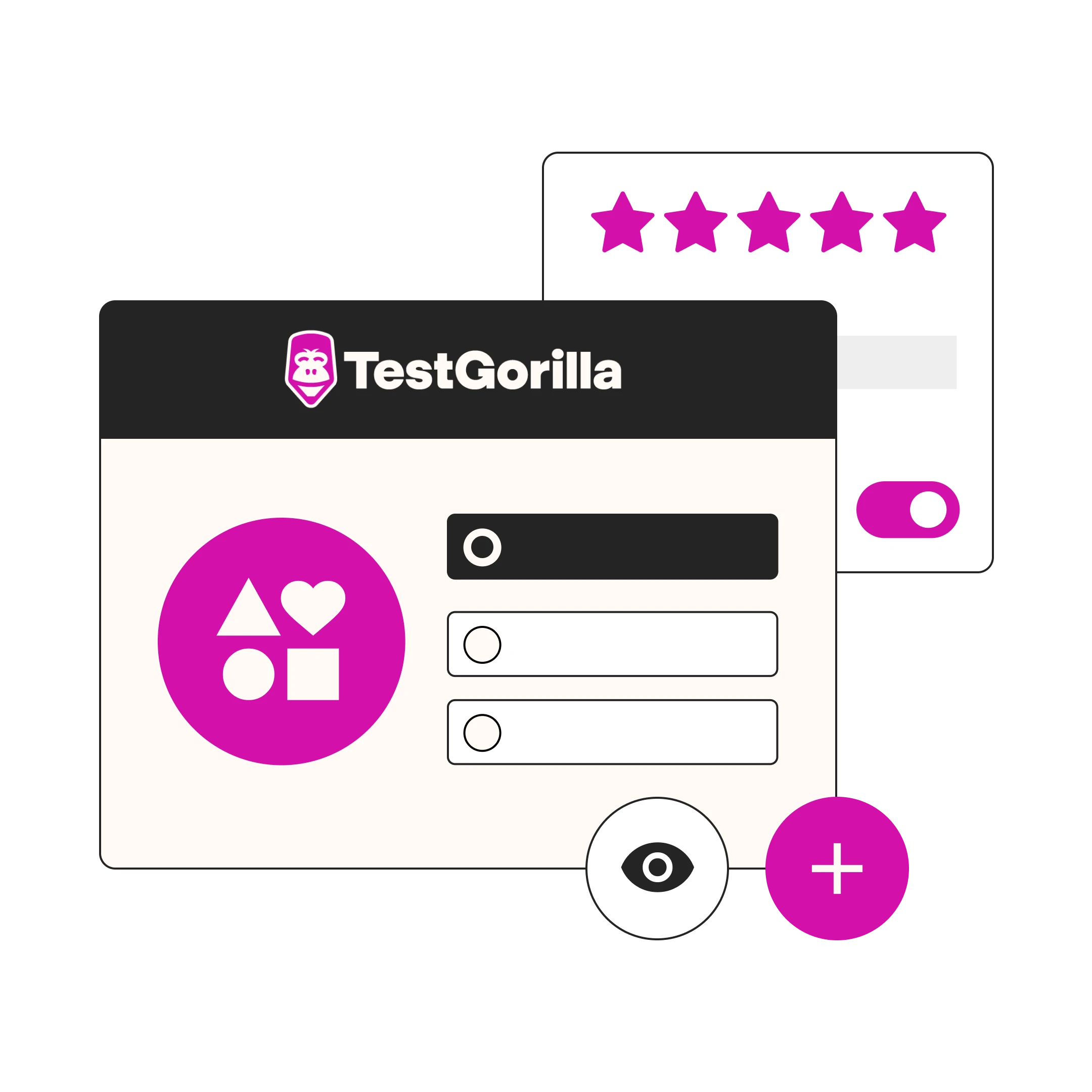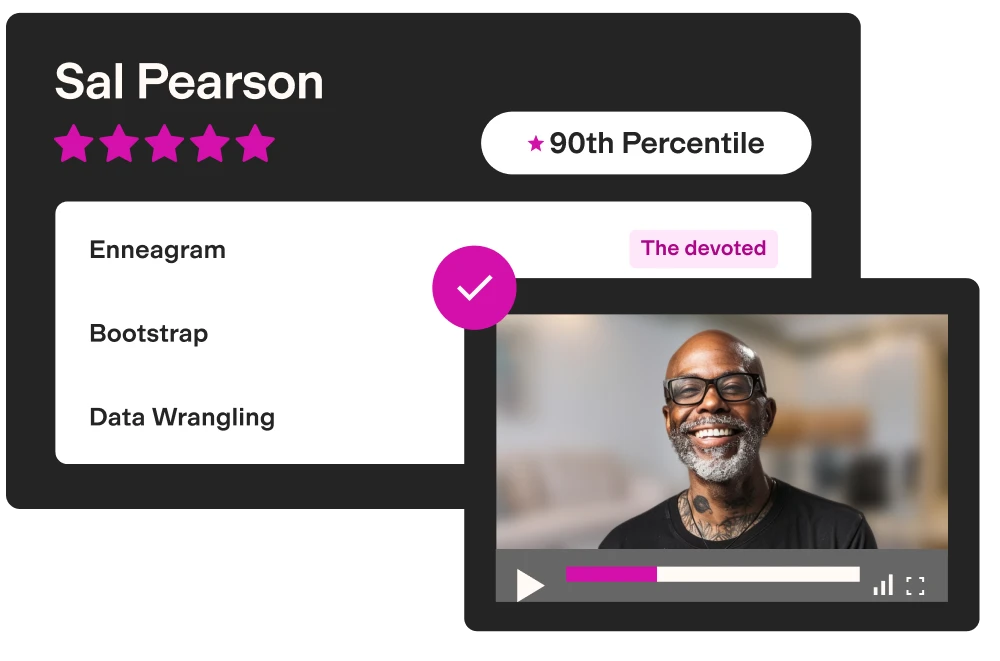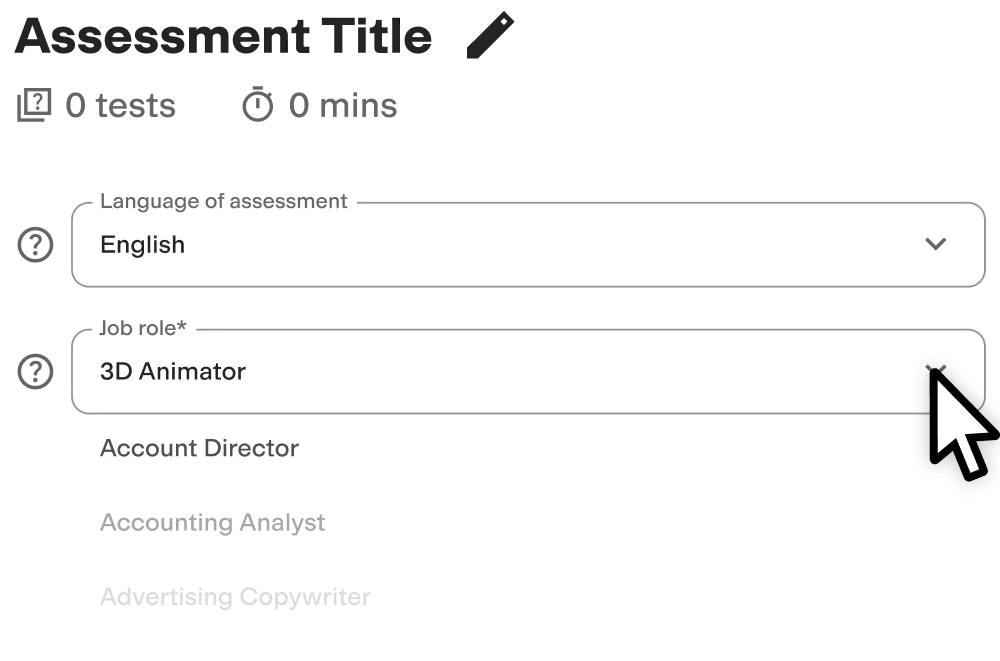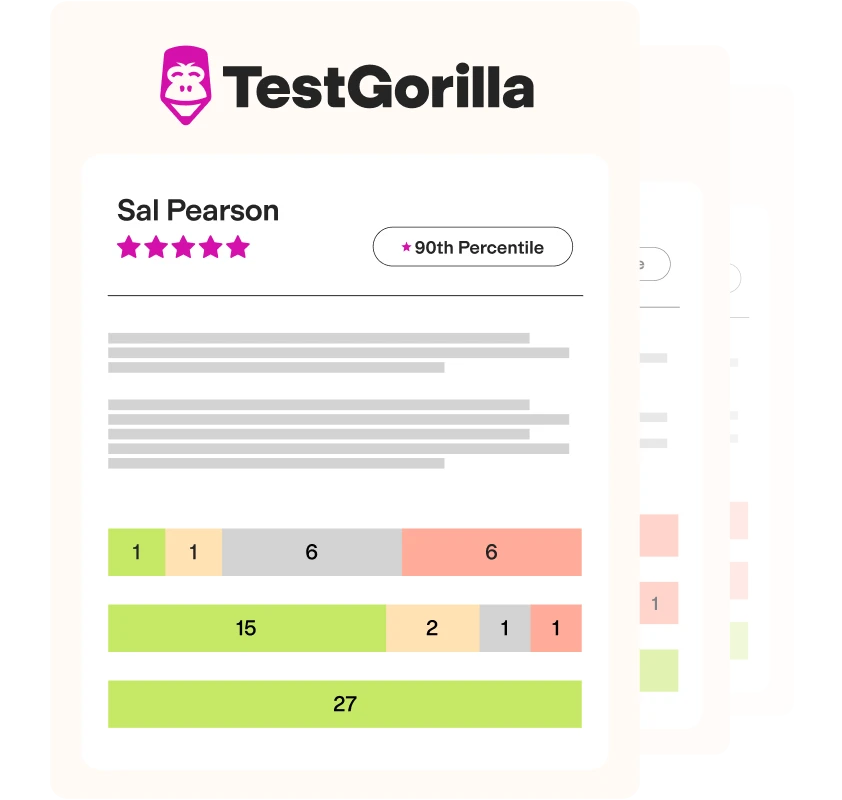Leadership & People management test: Pre-employment assessment to hire top managers and team leaders
Summary of the Leadership & People management test
The Leadership and People Management test evaluates a candidate’s ability to lead others within an organization using both influence and guidance. This test will help you hire leaders who can support and develop others to help your organization grow.
Covered skills
Delegate authority and task responsibility
Plan and support the development of others
Provide timely guidance and feedback
Gain acceptance of ideas and plans
Use the Leadership & People management test to hire
Managers, team leaders, and employees in other leadership roles.
About the Leadership & People management test
Powerful leaders scale your organization’s potential. They carry out impactful strategies and provide actionable directives that get results. This Leadership and People Management test evaluates candidates’ abilities to delegate authority and task responsibility, plan and support the development of others, provide timely guidance and feedback, and gain acceptance of ideas and plans.
Rather than proposing a specific leadership style, this test follows the situational theory of leadership developed by Blanchard and Hersey and asks candidates to evaluate factors to decide when to tell, sell, participate, or delegate in different scenarios based on the needs of each situation. This screening test will help you identify leaders who have a genuine interest in developing others and can unite talent behind important objectives.
These are the leaders who understand how to align the needs and goals of the organization with the skills and aspirations of their team members to produce results and satisfaction at all levels. Successful leaders lead by example and create a space where people can share ideas, ask questions, and be accountable for their actions.
The test is made by a subject-matter expert
Erika R.
Erika has been coaching team leaders, managers, and executives at companies of all sizes for over 10 years. A certified leadership and executive coach, Erika loves guiding the professionals she works with to explore their full leadership potential and equips with the strategies and tactics they need to lead and elevate others to do their best work.
Before turning to coaching full time, Erika started and led HR departments at various companies and built their learning and development programs.
Crafted with expert knowledge
TestGorilla’s tests are created by subject matter experts. We assess potential subject-matter experts based on their knowledge, ability, and reputation. Before being published, each test is peer-reviewed by another expert, then calibrated using hundreds of test takers with relevant experience in the subject.
Our feedback mechanisms and unique algorithms allow our subject-matter experts to constantly improve their tests.
What our customers are saying
TestGorilla helps me to assess engineers rapidly. Creating assessments for different positions is easy due to pre-existing templates. You can create an assessment in less than 2 minutes. The interface is intuitive and it’s easy to visualize results per assessment.

VP of engineering, mid-market (51-1000 FTE)
Any tool can have functions—bells and whistles. Not every tool comes armed with staff passionate about making the user experience positive.
The TestGorilla team only offers useful insights to user challenges, they engage in conversation.
For instance, I recently asked a question about a Python test I intended to implement. Instead of receiving “oh, that test would work perfectly for your solution,” or, “at this time we’re thinking about implementing a solution that may or may not…” I received a direct and straightforward answer with additional thoughts to help shape the solution.
I hope that TestGorilla realizes the value proposition in their work is not only the platform but the type of support that’s provided.
For a bit of context—I am a diversity recruiter trying to create a platform that removes bias from the hiring process and encourages the discovery of new and unseen talent.

Chief Talent Connector, small business (50 or fewer FTE)
Use TestGorilla to hire the best faster, easier and bias-free
Our screening tests identify the best candidates and make your hiring decisions faster, easier, and bias-free.
Watch what TestGorilla can do for you
Create high-quality assessments, fast
Building assessments is a breeze with TestGorilla. Get started with these simple steps.
View a sample report
The Leadership & People Management test will be included in a PDF report along with the other tests from your assessment. You can easily download and share this report with colleagues and candidates.
Why a leadership or management test is important
The Leadership and People Management test evaluates applicants’ ability to lead others in a team and organization. This management test will help you find people who have leadership qualities and can support and develop others in your company.
Leadership isn’t a position, but a role that requires the individual to improve the organization’s potential. Testing applicants for leadership skills helps you gain an understanding of their ability to manage and guide the organization.
In addition, managerial, executive, and C-suite roles all require leadership skills to help ensure applicants’ success, because they plan, oversee, and execute strategies and provide direction to departments and individuals in the company.
The Leadership and People Management test assesses the following skills:
Candidates’ ability to delegate tasks
Their skills when it comes to developing and supporting others
Their ability to lead the way and provide feedback
Candidates’ ability to influence others with their ideas
The management test does not assign specific leadership styles to the candidates who take it; rather, it puts them in scenarios where they need to use one of the following four leadership elements:
Tell
Sell
Participate
Delegate
This leadership framework was created by leadership experts Blanchard and Hersey and relies on situational leadership decisions.
Our pre-employment management test will help you determine which candidates have leadership capabilities and potential, which candidates want to develop others, and which ones have the skills to unite people behind a goal. These leaders also know how to connect team members’ professional and personal goals with the organization’s objectives and aims.
The most successful leaders create safe spaces where people can share their ideas freely and without fear. They ask questions and listen to their people, and they’re responsible and accountable for their actions (and inactions).
How you can use leadership skills in the workplace
There are plenty of ways you can use leadership skills across your organization.
• Sales: In the sales team, you want to have people who will take the lead and show the way to others. Salespeople can find themselves frequently in new positions, so this team needs people who can think and act on the spot, leading by example.
• Marketing: Marketing needs bold people who aren’t afraid to take risks and lead. With attention spans going down to six to seven seconds, marketing teams need leaders who aren’t afraid to innovate and try out new things to achieve results.
• Product development: These teams need leaders who can listen to ideas from their colleagues and see if there’s merit in them. This can result in new products that become another revenue stream for the company. So leaders are needed to hear people out and decide if their ideas are good enough to “bet on them.”
• HR: HR teams need leaders who will push new initiatives to bring better results. With engagement rates falling to less than 30%, HR leaders need to start new initiatives, get people behind a single connecting purpose, and lead by example.
There are also general uses of leadership in the workplace, such as finding talent who might become the next C-level executives to lead the organization.
Leadership competencies for candidates
There are certain skills all good leaders share. They are:
• Communication skills: All good leaders know how to communicate with peers, colleagues, managers, and other stakeholders. They understand that they need to present their message in a way that will convince others to follow their lead.
• Motivation: Good leaders need to know how to motivate others, whether it’s the final push in a long project or jump-starting a new product.
• Ability to delegate: Leaders know that they can’t do everything by themselves, so they learn to trust others. Because of trust, they can delegate tasks to their team members and be confident that they will complete them successfully.
• Integrity: Good leaders are ethical and they walk the talk. They keep their word and promise only things that they know they can deliver.
• Responsibility: To be a good leader, someone must be accountable and responsible for their actions and their people. They know that their team members need to believe that they can rely on them in times of need.
• Decision-making skills: Good leaders know that they need to make decisions even when the information available is limited. They know that people count on them to be decisive and they know that any decision is better than no decision.
• Problem-solving: Being a problem-solver is a key feature of a good leader. Not only do they lead by example, but they also know that they need to lead their people through uncertainty and trust in their ability to solve problems when they emerge.
By using a management test, you can identify which applicants have exceptional leadership skills.
What happens when a candidate doesn’t have leadership skills
Bad leadership can hurt your teams and your entire organization. If you hire people who are bad leaders and put them in management positions, they can cause a lot of damage to your company. Bad leaders share the following traits:
• Not recognizing people for good work: Bad leaders don’t recognize or reward their employees for good work. And some leaders even take credit for the work of their team members, destroying morale in the process.
• Disrespecting employees: People who don’t respect employees and treat them badly are poor leaders. This behavior can be anything from snarky comments to passive-aggressive attitudes.
• Avoiding conflict: Good leaders know that some conflict is necessary for a team to function. Bad leaders take an extreme approach: they either have conflict all the time (unnecessary conflict) or completely avoid it (problems boil under the surface until they explode).
• Lack of flexibility: Bad leaders have a “my way or the highway” attitude, where they don’t consider different approaches to a problem. Good leaders set goals and boundaries and let team members find the solution independently.
How the Leadership test can help recruiters hire
With the Leadership and People Management test, you have a bias-free and objective way of measuring leadership qualities in your candidates. A management test can help you identify the best person for the job and help you to avoid a bad hire. On top of that, pre-employment tests streamline the recruitment process for your hiring manager, helping them to make faster, easier and better decisions without needing to sift through hundreds of CVs.
In summary
Leadership skills are important in the workplace, so you should always hire people who have good leadership skills and leadership potential. To do this, use a pre-employment Leadership and People Management test to determine candidates’ leadership skills in a bias-free and objective way.










